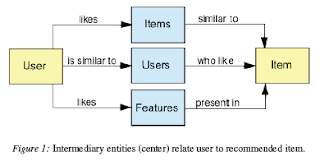Related comments:
Summary:
In this paper, Jesse Vig, Shilad Sen, and John Riedl from University of Minnesota's Grouplens Research present Tagsplanations, a system of explaining system recommendations based on community tags. Popular media services like Netflix or iTunes often have recommender systems that suggest similar items based on the user's previous selections or perceived "tastes." The researchers first discuss the most common method of recommendation - establishing an "intermediary entity" between the user and the item to be recommended. This is the typical model of an intermediary entity:
Tagsplanations uses tags to establish this intermediary. For example, “We recommend the movie Fargo because it is tagged with quirky and you have enjoyed other movies tagged with quirky.” They aim to provide the user more information about why a user might like a recommendation. It uses several features like tag preference, relevance, and filtering to increase the overall quality of the tags.
The researchers conducted a user study in which participants tested Tagsplanations in four different interfaces and filled out a survey about their experience. 80% of the subjects found that the system helped them understand recommendations better and make a selection decision.
Discussion:
From my experience with Netflix, I know that tagging and recommendation systems can help a user discover new media that they otherwise might not have come across. I think Tagsplanations is a great way to bolster current recommendation systems and help users make decisions about what they want to see. The specific tags are a lot better than a vague "you might also like this" statement.


1 comments:
80% eh?
I like the idea of providing why a recommendation is there. It sounds like it would make the system more precise.
Post a Comment